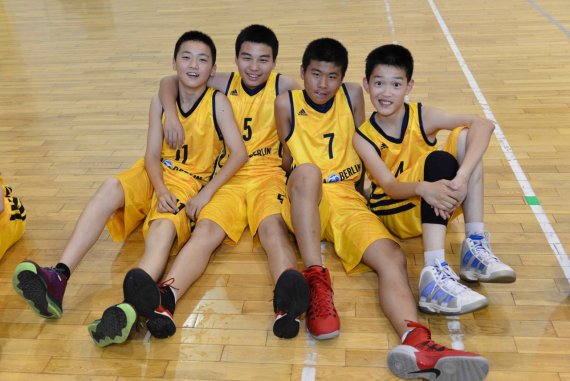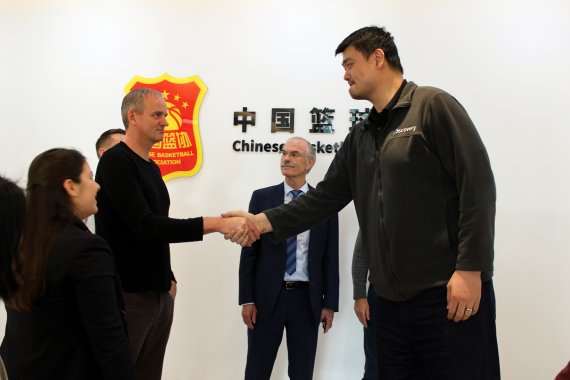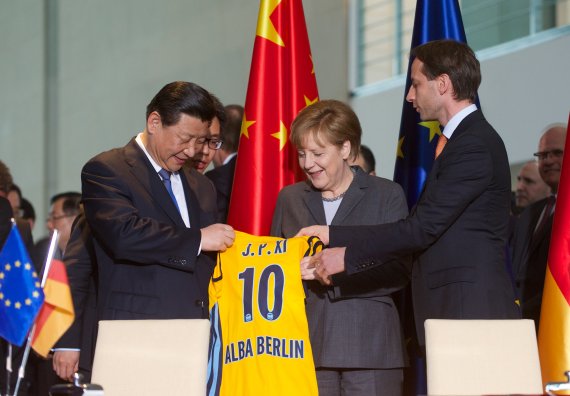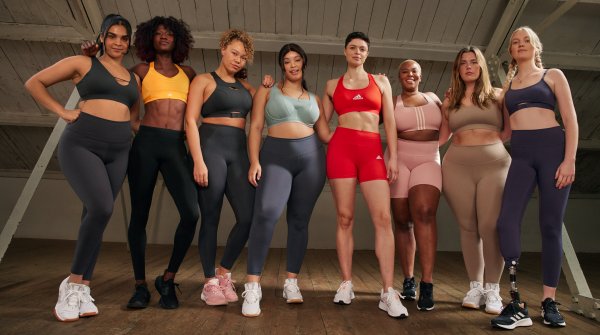
Yao Ming is a hero in China. In 2002, the 2.29-meter giant was the first Chinese ever to join the NBA and became a superstar at the Houston Rockets. More than 200 million Chinese watched his first game for the Rockets on TV. But after nine years at the highest level, Ming's body was at the end of its rope: due to several fatigue fractures in his left foot, Ming had to end his career in 2011 at the age of just 30.
For Ming's role in Chinese basketball, however, this was not the end, but merely a change of perspective: Yao Ming has been chairman of the Chinese Basketball Association CBA and the professional Chinese league of the same name since 2017. He is still the figurehead in Chinese basketball. His goal: To finally change that. "If 10 years from now we still use Yao Ming to represent China, it's a failure on my job. We need a new star to rise up," Ming told Sports Illustrated.
The signs are actually good: 300 million Chinese play basketball according to an NBA study. With over 180 million social followers, the NBA is China's most popular sports league. Nevertheless, the NBA and the EuroLeague - the two strongest basketball competitions in the world - are currently looking in vain for talent from the Far East. Also at the Basketball World Cup, which will take place for the first time in China from August 31 to September 15 - of course with Yao Ming as ambassador of the tournament - China is only considered as outsider.
In order to change this in the future, Ming has turned the domestic league upside down: the number of teams has been increased, dusty team names and logos have been spiced up at Ming's behest. The trophies for the top players of the league, which were ordered in the last years in online shops, are now custom-made. All this was made possible, among other things, by winning China Life Insurance as a major sponsor for the league.
But the biggest problem for the CBA, which after all pays the second highest salaries in the basketball world after the NBA, remains the scouting for talented players: Only 14 Chinese players from a university team made the leap into a CBA team in the draft 2018.

"There's still too much potential lost, for a variety of reasons. Most Chinese families still do not consider it desirable to let their children become professional athletes", explains Conrad Ziesch, Project Manager China at the German basketball club ALBA Berlin, in an interview with ISPO.com.
Ziesch and ALBA Berlin are pioneers in Europe: since 2011, the Bundesliga club has been linking German and Chinese basketball players with an exchange programme. With the Guangdong Southern Tigers the Berliners connect a club partnership. In addition, the ALBA professionals have already played three friendly matches in China. In autumn 2018, a club delegation travelled to the Middle Kingdom together with the German State Secretary Heiko Maas.
ALBA Berlin has signed long-term cooperation agreements with the Beijing and Shanghai Basketball Associations which, among other things, promote youth exchanges between the two countries.
"Our goal is to bring German and Chinese kids together through basketball and playfully support the learning of a new language. For many years we have been organising tournaments, camps and teacher training for this purpose", said Ziesch, who also spoke about the Chinese sports market at the ISPO Munich at the China Deep Dive Conference: "We are pursuing a similar content concept with students, cooperating here with the renowned Tongji University Shanghai and the TU Berlin. At association level, we maintain partnerships with the Beijing and Shanghai Basketball Associations.“
In eight years of commitment, Ziesch and ALBA Berlin have found the right tone in talks with Chinese partners: in China, personal contacts and the cultivation of their own network play an even greater role than in Europe. "For Chinese partners, expanding and maintaining contacts is at least as important as media reach and brand building. We support this by opening our network to our partners and actively supporting them in networking.“
A concept that ultimately benefits both sides: Chinese junior players, teams and associations receive the know-how of Western professional structures, while ALBA Berlin gains new partners: "In recent years we have already had two Chinese major and jersey sponsors. We can offer Chinese companies both the attractive platform in European top basketball and our international CSR program.“

The NBA recognised early on that involvement in Chinese basketball is also worthwhile for the West: As early as the late 1980s, the then NBA commissioner David Stern negotiated broadcasting rights with China's state broadcaster CCTV. Every final round of the NBA in China has been broadcast live since 1994.
In the 2017/18 season, 640 million Chinese watched at least one NBA broadcast - almost twice the population of the USA.
The NBA has been playing games in China since 2004. In the meantime, 23 games of the so-called preseason have already taken place in China. In October, superstar LeBron James with his Los Angeles Lakers will come and play in Shanghai and Shenzhen against the Brooklyn Nets, 49 percent of which are owned by Alibaba co-founder Joe Tsai.
To strengthen its cooperation with China, the NBA set up the "NBA China" organization in 2008. In the meantime, this brought the league 25 Chinese marketing partners, including the sporting goods giant Anta, milk producer Mengniu and the tourism company Ctrip. NBA China CEO Derek Chang: "When global partners are looking at the NBA, I think for them the two big markets are really the U.S. and China. And in some respects for some of these guys, they start to look at China as almost a bigger opportunity going forward.".
The NBA has now opened 200 NBA Style Stores in China and a new NBA Flagship Store was opened in Beijing in April 2019. The focus there? More streetwear than sportswear. "You see people all over the street in NBA-branded outfits," says Chang.
But even the stars of the NBA, the players, have long since skilfully entered the Chinese market: partnerships with Chinese brands are no longer an exception. In June 2018, Klay Thompson of the Golden State Warriors signed a ten-year contract for 80 million dollars with Anta.
Dwyane Wade - who ended his career after last season - has a lifetime contract with the Chinese sports fashion brand Li Ning.
The biggest superstar in China, however, is Jeremy Lin of the reigning champion, the Toronto Raptors. According to the "NBA Red Card 2018 China Digital Report" from the Mailman Institute, the son of Taiwanese parents is the most popular NBA player in China. Not least because Lin's management runs a social campaign tailored to Chinese consumers: On Weibo Lin's account posts in high frequency, again and again snapshots with online stars can be seen there. In addition, there is now its own cartoon series about Lin. Lin was involved in a documentary about the Chinese New Year - the most important Chinese holiday - which was broadcast on the Weibo Channel of the NBA.
Lin is also present on new trend channels such as the video snippet platform Douyin, where he is the most followed western athlete with 7 million followers.
But even for the NBA and its stars, the road to the Chinese market is not a one-way street. Numerous cooperations are intended to benefit young Chinese basketball players: The league has set up NBA playzones in Beijing, Shanghai and Chengdu. Children between the ages of three and ten can play there and find their way to sport.
In addition, with the Jr. NBA there is its own series of junior tournaments, which reaches four million Chinese students. There are NBA Academies in three Chinese provinces and a joint basketball school.
"We want to help drive the development of competitive basketball in China," said Chang. "This not only broadens the sport, but also takes it to a whole new level."
A cooperation in favour of the Chinese national team, which Yao Ming has agreed with the NBA, also fits into this notch: In the run-up to the home World Cup, the national team was able to compete with NBA teams in friendly matches at the NBA Summer Games.
It is another small intermediate step on Yao Ming's mission to turn China from the land of basketball lunatics to the land of basketball stars.
„Yao Ming has already initiated reforms that point in the right direction. A major event such as the World Cup in their own country will also give a boost once again," says ALBA Berlin's China boss Conrad Ziesch: "Of course, something like this won't work overnight, but takes time.“
 Sports BusinessSki Mountaineering Goes Olympic: What Milano-Cortina 2026 Means
Sports BusinessSki Mountaineering Goes Olympic: What Milano-Cortina 2026 Means
- ISPO awards
- Mountain sports
- Bike
- Design
- Retail
- Fitness
- Health
- ISPO Job Market
- ISPO Munich
- ISPO Shanghai
- Running
- Brands
- Sustainability
- Olympia
- OutDoor
- Promotion
- Sports Business
- ISPO Textrends
- Triathlon
- Water sports
- Winter sports
- eSports
- SportsTech
- OutDoor by ISPO
- Heroes
- Transformation
- Sport Fashion
- Urban Culture
- Challenges of a CEO
- Trade fairs
- Sports
- Find the Balance
- Product reviews
- Newsletter Exclusive Area
- Magazine




